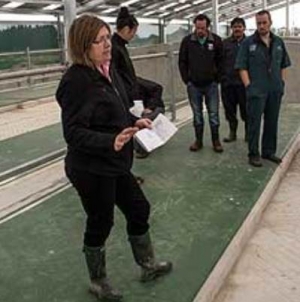MASSEY UNIVERSITY is testing a barn farm system with potential for improved productivity and better water quality on dairy farms.
Professor Mike Hedley, who leads the research at Massey, discussed the work recently with local farmers at the newly-built free stall barn.
The common practice of standing cows off pasture to reduce winter treading damage to pastures during wet soil conditions can also reduce losses of nutrients in surface runoff and drainage, he says. Loss of nitrogen to water is reduced if paddock urine patch load can be transferred to the standoff facility, such as a freestall barn, at critical times of the year.
The work is part of the Pastoral 21 research programme being conducted at the No.4 Dairy unit by scientists from Massey, AgResearch and DairyNZ.
The new research facility, a $1.4 million free stall barn has feeding and resting areas for 200-300 cows. "It is a significant undertaking for any farm and our work will explore how to manage the system to benefit production and the environment," Professor Hedley says.
Stu Walsh and Steven Shaw, herd managers at the Massey's No.4 farm, will use the freestall barn to house cows when they would do treading damage to winter wet soils and also house cows to reduce the summer- autumn urine load in the paddock.
Soil Scientists Dr Dave Horne and James Hanly studied the Manawatu weather and soils and found soils may be prone to severe treading damage for as long as 11 days at one time.
Dr Jean Margerison (Dairy Systems), researched different bedding systems for free-stall barns and the newly built freestall barn will contain four different bedding systems capable of housing cows comfortably for long periods if necessary.
The barn has been completed to be ready for the research programme in November. Almost everything will be measured to help establish the best, cost effective system. This includes how the cows behave and adapt to being housed from the moment they are introduced to the barn. The comfort and effectiveness of cow mattresses – sand, rubber and foam - in the individual stalls will be assessed as will the barn cleaning systems.
The farm scale trial builds on the findings of Christine Christensen, a PhD student, who refined the practice of "Duration controlled grazing". This allows cows to eat their normal grass diet and for them to be housed while they ruminate, rest and eat supplement.
A well-fed, highly productive cow spends about 11 hours a day lying and ruminating as it turns grass into milk. Much of that lying can be in the house where urine and dung can be collected and can be re-applied uniformly as slurry to pasture to boost pasture production. Low rates of uniformly applied slurry cause no increase in nitrogen loss through drainage water
The production from 200 cows that will be housed part-time in the barn will be compared with another herd of 200 representing more typical management in the lower North Island – 40% of the herd grazed off in winter and a feed-pad to accommodate cows on wet winter and spring days.
A "reference group" of local farmers has been asked to contribute their experience to assist in the development of management rules for both farming systems.
At the recent farm reference group meeting Dave Horne and James Hanly discussed appropriate effluent management systems for the housed cows.
The team emphasises that the effluent system must be customised for each farm. Key factors important to deciding which effluent-land application systems are appropriate include the type of standoff facility, the barn or house for the cows and how long the cows may be housed. These factors influence the volume and consistency of the effluent.
An understanding of the soils and climate of the region is also important in deciding what storage and labour the system will require there are several systems to consider.
These include whole effluent storage or solids separation and sprinkler, rotating irrigator or manure wagon application. In Manawatu, for example, the wet winter and high likelihood of run-off means effluent cannot be applied to wet soils mid-year, so storage is important. Consideration should also be given to combining the barn effluent storage with the cow shed effluent storage or building new storage facilities and keeping them separate.
The research programme continues until 2016 when Professor Hedley and his team will have tested the two systems for comparative productivity, cost and impact over the coming seasons.
Pastoral 21 is a collaborative venture between DairyNZ, Fonterra, Dairy Companies Association of New Zealand, Beef + Lamb NZ and the Ministry of Business, Innovation and Employment. Its goal is to provide accessible systems-level solutions for profitably increasing pastoral production while reducing farms' environmental footprint.



















